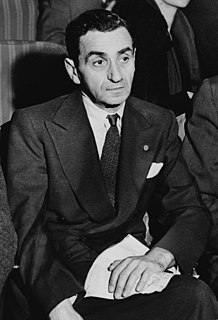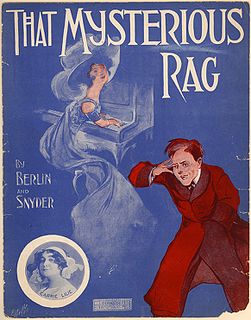Ragtime – also spelled rag-time or rag time – is a musical style that flourished from the 1890s to 1910s. Its cardinal trait is its syncopated or "ragged" rhythm. Ragtime was popularized during the early 20th century by composers such as Scott Joplin, James Scott and Joseph Lamb. Ragtime pieces are typically composed for and performed on piano, though the genre has been adapted for a variety of instruments and styles. "Maple Leaf Rag", "The Entertainer", "Fig Leaf Rag", "Frog Legs Rag", and "Sensation Rag" are among the most popular songs of the genre.

Scott Joplin was an American composer and pianist. Because of the fame achieved for his ragtime compositions, he was dubbed the "King of Ragtime." During his career, he wrote over 40 original ragtime pieces, one ragtime ballet, and two operas. One of his first and most popular pieces, the Maple Leaf Rag, became the genre's first and most influential hit, later being recognized as the archetypal rag. Joplin considered ragtime to be a form of classical music and largely disdained the practice of ragtime such as that in honky tonk.

Irving Berlin was a Russian-American composer, songwriter and lyricist. His music forms a large part of the Great American Songbook.

"Alexander's Ragtime Band" is a Tin Pan Alley song by American composer Irving Berlin released in 1911 and is often inaccurately cited as his first global hit. Despite its title, the song is a march as opposed to a rag and contains little syncopation. The song is a narrative sequel to Berlin's earlier 1910 composition "Alexander and His Clarinet". This earlier composition recounts the reconciliation between an African-American musician named Alexander Adams and his flame Eliza Johnson as well as highlights Alexander's innovative musical style. Berlin's friend Jack Alexander, a cornet-playing African-American bandleader, inspired the title character.
Ragtime is a style of music.

John Joseph Haley Jr. was an American actor, comedian, dancer, radio host, singer and vaudevillian. He was best known for his portrayal of the Tin Man and his farmhand counterpart Hickory in the 1939 Metro-Goldwyn-Mayer film The Wizard of Oz.
Lynn Ahrens is an American writer and lyricist for the musical theatre, television and film. She has collaborated with Stephen Flaherty for many years. She won the Tony Award, Drama Desk Award, and Outer Critics Circle Award for the Broadway musical Ragtime. Together with Flaherty, she has written many musicals, including Lucky Stiff, My Favorite Year, Ragtime, Seussical, A Man of No Importance, Dessa Rose, The Glorious Ones, Rocky, Little Dancer and, recently on Broadway, Anastasia and Once on This Island.

Collins & Harlan, the team of American singers Arthur Collins and Byron G. Harlan, formed a popular comic duo between 1903 and 1926. They sang ragtime standards as well as what were known as "coon songs" – music sung by white performers in a black dialect. Their material also employed many other stereotypes of the time including Irishmen and farmers. Rival recording artist Billy Murray nicknamed them "The Half-Ton Duo" as both men were rather overweight. Collins and Harlan produced many number one hits with recordings of minstrel songs such as "My Gal Irene", "I Know Dat I'll be Happy Til I Die", "Who Do You Love?" and "Down Among the Sugarcane". Their song "That Funny Jas Band from Dixieland", recorded November 8, 1916, is among the first recorded uses of the word "jas" which eventually evolved to "jass", and to the current spelling "jazz".
William David "Bill" Brohn was an American arranger and orchestrator, best known for his scores of musicals such as Miss Saigon, Ragtime and Wicked. He won the Tony Award for Best Orchestrations for Ragtime and won the Drama Desk Award for Outstanding Orchestrations three times.

Alexander's Ragtime Band is a 1938 musical film released by 20th Century Fox that takes its name from the 1911 Irving Berlin song "Alexander's Ragtime Band" to tell a story of a society boy who scandalizes his family by pursuing a career in ragtime instead of in "serious" music. The film generally traces the history of jazz music from the popularization of Ragtime in the early years of the 20th century to the acceptance of swing as an art form in the late 1930s using music composed by Berlin. The story spans more than two decades from the 1911 release of its name-sake song to some point in time after the 1933 release of "Heat Wave", presumably 1938.

Ian Timothy Whitcomb was an English entertainer, singer-songwriter, record producer, writer, broadcaster and actor. As part of the British Invasion, his hit song "You Turn Me On" reached number 8 on the Billboard Hot 100 chart in 1965.
"Now It Can Be Told" is a popular song written by Irving Berlin for the 1938 film Alexander's Ragtime Band, where it was introduced by Alice Faye and Don Ameche. It was nominated for an Academy Award in 1938 but lost out to "Thanks for the Memory".

"That Mysterious Rag" is a song by Irving Berlin and Ted Snyder written in 1911. It was one of the earliest Berlin songs to become a commercial success with recordings by Arthur Collins & Albert Campbell and by the American Quartet being very popular in 1912.

"That International Rag" is a song composed by Irving Berlin in 1913. Berlin wrote the song the night before its debut, when he needed a new opening number for his act while on tour in England.
Bernard Herzbrun was an American art director. He was nominated an Academy Award in the category Best Art Direction for the film Alexander's Ragtime Band. He worked on 275 films between 1930 and 1955. He was born in New York City, New York and died in Los Angeles, California.
Alexander's or Alexanders may refer to:
Fred Santley, also known variously as Freddie Santley, Fredric Santley, Frederick Santley, Frederic Santley, and Fredric M. Santley, was an American character actor of the silent and sound film eras, as well as an actor on the Broadway stage. Born in Salt Lake City, Utah on November 20, 1887, as Frederic Mansfield, the son of Laurene Santley, and the stepson of stage actor Eugene Santley. He was the brother of filmmaker and stage actor Joseph Santley, both of whom adopted the surname of their stepfather as their stage name. He would make his acting debut in a 1907 short, Pony Express, and would continue to make shorts throughout the 1910s and 1920s. In addition, he would appear in numerous plays during this period, including more than a dozen Broadway productions.
Bing Crosby Sings with Al Jolson, Bob Hope, Dick Haymes and the Andrews Sisters is a Bing Crosby Decca Records studio 78rpm album of phonograph records featuring Crosby with several of Decca's top artists.
Alexander's Ragtime Band was one of the first all-steel percussion bands in Trinidad and Tobago and is considered a forerunner of the steelband. The band was organised at the Big Yard in Newtown in western Port of Spain, and first emerged on Carnival Monday morning in 1939. Named for the film Alexander's Ragtime Band, the band was louder and more mobile than tamboo bamboo bands that were popular at the time, and represented a change in musicality. They inspired the rapid adoption of steel percussion by bands in Port of Spain, leading to the development of the steelpan.








